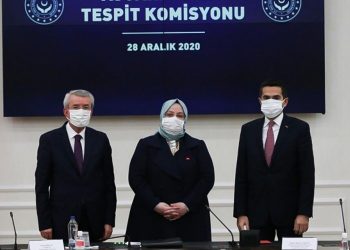Uğur Deniz – İstanbul
In Turkey, as inequality deepens, the education system has collapsed. Due to Turkey’s coronavirus outbreak, the distance education system EBA (Education Information Network) collapsed on its first day.
Whilst teachers and students could not log into the system, they encountered a “too crowded” warning. Parents have questioned the manner in which the authorities have acted: “Didn’t you foresee that many people would log-into the system at the same time in these circumstances? What have you done for months? Why is the country’s Ministry of Education still not prepared for the pandemic that has been going on for months? How did the epidemic affect the equality of opportunity in education? What other crises await us in the education system? What can we do?”
We talked to the Education and Science Workers’ Union (Eğitim-Sen) Secretary-General Özgür Bozdoğan about these concerns.
What has been the impact of the pandemic, which started in mid-March, on education?
Educational institutions were closed in mid-March after the beginning of the outbreak and remained closed for over two months. Nearly one and a half billion students and 63 million teachers around the world had to turn to the distance education system. Many problems and challenges arose with this. The most crucial issue related to poor students’ difficulties in accessing online education compared to other students.
Furthermore, under lockdown conditions, students aged between 4-18 years-old faced a disconnection with the outside world. Distance learning education caused millions of children to experience a traumatic period. In other words, whilst there was a health crisis, this turned into a global education crisis. This crisis is still going on and there is no resolution in sight for this. We saw the projection of this process and crisis in Turkey and globally. Education was suspended in mid-March and the distance education or Emergency Distance Learning process began.

What measures were taken in Turkey: What is missing?
As in other countries of the world, Turkey was unprepared for this process. From March to June, there were some structural problems; these can be justifiable. But what about the period after this? It is unacceptable that the problems have increased exponentially during the period from March to 21 September.
There is an educational process that starts with transferring the course contents prepared only for education to online platforms and showing them on television channels. But there is no plan and no goal. The purpose and means of relations have not yet been established correctly. As we all predicted that the pandemic would continue, the Ministry of Education (MEB) should have moved forward with fewer problems, having anticipated this. However, they insisted on not addressing these current issues and concerns.
What about the current situation?
Access to distance education is a fundamental problem. Nearly a third of students in Turkey are unable to access distance education. MEB does not see this as a problem, nor does it produce a solution to address this. Face-to-face teaching is only for 1st grade and pre-school students, and that is only for students whose parents have given consent to attend school.
In short, we are experiencing a period in which problems regarding distance education continue. We face many issues ranging from lesson planning to not creating quality lessons. We face problems regarding classes that extend for too long. There are also lesson plans that are not suitable for children’s development. Let me put it differently: You cannot teach a seven-year-old child by placing him/her in front of a screen for 28 hours a week. It is not possible, for both the child and the teacher.
How does this situation deepen the issue of inequality of opportunity in education?
Equality in education is a prerequisite. If you cannot equally access all children to education, then it becomes a privilege. According to the Ministry of National Education, around 9,600,000 students used EBA in the last period, but 15,400,000 students actively need to use it. In other words, about 6 million students have never used EBA. These students do not use EBA because they do not have access to the internet or do not have the necessary tools for distance education.
Compulsory education for twelve years is the responsibility of the state. However, millions of students still cannot access education, and the ministry has inadequate measures in place to provide equal access to the same educational opportunity. Minister Ziya Selçuk says that “children will go to their schools to take exams”. But which topics will they be examined on, the issues they took in distance education? If that is the case, how will those children who cannot access distance education be tested? It’s a real problem. We should not forget that we are pushing someone out of the system under conditions such as these, where we cannot achieve equality.
Will such inequality lead to the collapse of the education system in the long run?
It is collapsing right now. There cannot be a system that does not provide a future for children, pushes them out of the system and turns them into cheap labour. It is a system of elimination, creating child labour production, not providing education. The ministry visits children working as seasonal agricultural workers in the field and gives them books and purchases tomatoes in return, but it does not question the fundamental issue: “Why are you in the field? The children should be in school instead of in the field”. This mentality needs to be questioned and changed. We cannot talk about equality of education without combating child labour, poverty and ensuring equality in education.

What does the future hold for us?
As long as this inequality continues, the dominant order resembling the caste system prevails. It is a matter of our shared future. However, many people will be negatively affected by this system, and it is a major concern.
What are the suggestions of Eğitim-Sen?
We will seriously act to ensure that equal opportunity prevails in education, where we demand equal access of all children to learning and the provision to all children of the right to education.
In the coming days, we will establish Education Monitoring Boards in all provinces and districts. Through these, we intend to bring the issue of equality in education to the public’s attention. It is impossible to take any further steps before these critical issues are resolved. Successful Transition to High Schools Exams (LGS) and Higher Education Institution Exams (YKS) can only take place if these concerns are resolved.

















